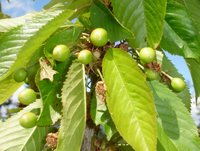 I have been very impressed by my little fruit trees. They were only planted last Spring, and already last year the espalier apple provided 3 fruits, and the regular apple tree tried to offer a few (too late in the year to ripen). This year, I have been surprised by the number of fruits they are trying to provide.
I have been very impressed by my little fruit trees. They were only planted last Spring, and already last year the espalier apple provided 3 fruits, and the regular apple tree tried to offer a few (too late in the year to ripen). This year, I have been surprised by the number of fruits they are trying to provide.The Lapin cherry (which is a dark cherry, similar to the Bing) is full of small fruits, as shown in the photo on right. The Bartlett pear has a half dozen tiny fruits showing. The apple tree is displaying fruits. The blueberry bushes (we have approx 8) are loaded. The red and missouri currents have strings of berries forming. The raspberries are loaded in tiny fruits and blossoms, visited by big black bumblebees. The two plums are still resting this year, and that's fine by me. It is also too soon for the Rainier cherry (new this year), but the tree appears to be healthy, and the persimmon (also new) is finally putting out new growth also.
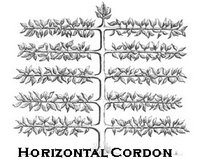
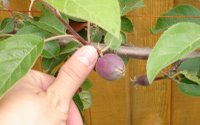 The big surprise to me is my espalier apple tree (see "thumbnail" photo on left). This espalier apple tree, which is in the "horizontal cordon" form, is formed by grafting three different varieties of apple (which I have written down, but don't recall) onto a dwarf stock. The top variety has been very successful, with a cluster of 2 or 3 tiny fruits per fruiting spur. I gave it some "tough love" yesterday, removing all but 1 fruit on each spur. Even so, one branch has 13 fruits left, and the other branch 21 fruits, from what I recall. I am amazed by the potential fruit-bearing capacity of these espalier trees!
The big surprise to me is my espalier apple tree (see "thumbnail" photo on left). This espalier apple tree, which is in the "horizontal cordon" form, is formed by grafting three different varieties of apple (which I have written down, but don't recall) onto a dwarf stock. The top variety has been very successful, with a cluster of 2 or 3 tiny fruits per fruiting spur. I gave it some "tough love" yesterday, removing all but 1 fruit on each spur. Even so, one branch has 13 fruits left, and the other branch 21 fruits, from what I recall. I am amazed by the potential fruit-bearing capacity of these espalier trees!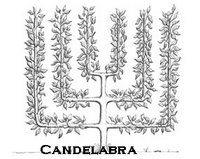
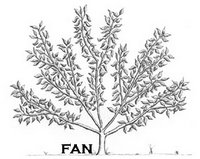 The second variety of apple in the espalier tree displays less than half the number of fruits. The third (bottom) seems to only have a few. This favouring of the top branches is also evident in the vegetative growth, with the top branches being the longest, with the most side branches, and fullest leaves. This seems to be a drawback of the horizontal cordon shape. Some of the other espalier forms may more fairly distribute the tree's growth and fruit production. I've included here a nice set of drawings by Beth Thevenot of the classic espalier forms. They were lifted from the site SouthernAccents.com.
The second variety of apple in the espalier tree displays less than half the number of fruits. The third (bottom) seems to only have a few. This favouring of the top branches is also evident in the vegetative growth, with the top branches being the longest, with the most side branches, and fullest leaves. This seems to be a drawback of the horizontal cordon shape. Some of the other espalier forms may more fairly distribute the tree's growth and fruit production. I've included here a nice set of drawings by Beth Thevenot of the classic espalier forms. They were lifted from the site SouthernAccents.com.
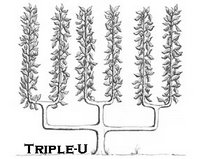 I also have an espaliered asian pear, also in the "horizontal cordon" form, which has three varieties of asian pear. This year it is also showing a number (maybe 10) small fruit. I wish I had more room along the fence, I am tempted to buy or train a third espaliered fruit tree. Maybe a peach?
I also have an espaliered asian pear, also in the "horizontal cordon" form, which has three varieties of asian pear. This year it is also showing a number (maybe 10) small fruit. I wish I had more room along the fence, I am tempted to buy or train a third espaliered fruit tree. Maybe a peach?

I need advice on which espalier form you would use for a 'living fence' around my potager garden. I thought I would underplant with Rosa Rugosa bushes to end up with an impenatratable fence. since the rectangular shape calls for many trees to surround it, I am a bit stumped (pun intended) by the variety of choices from my research. Yours is by far the best summary discussion with details!. Detail design and sizes are on my new blogsite. www.sharingthyme.blogspot.com
ReplyDeleteHi
ReplyDeleteI'm from Vancouver and was wondering where you got your espaliered apple pear as I am looking for one too.
I bought mine at Triple Tree Nursery on Lougheed Highway in Maple Ridge, but I've seen similar ones at Gardenworks in Burnaby also.
ReplyDeleteAlthough there are some fruit trees available at any time during the year, the best selection seems to be in late winter (about February), when the fruit trees are brought in, most of them bare-root. Your favourite local nursery would be able to advise you more specifically.